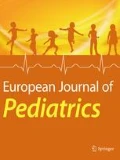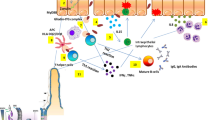Abstract
Initiation of a lifelong, gluten-free diet (GFD) in children with celiac disease (CD) influences the child’s life in many ways. The aim of this study was to assess the influence of GFD on the child and his/her family’s eating habits and lifestyle behaviors. To study this, we asked children and their parents completed the Family Eating and Activity Habits Questionnaire (FEAHQ) at the time of diagnosis of CD and at least 6 months after initiation of GFD and a questionnaires assessing symptoms related to CD and adherence to the GFD diet. We analyzed questionnaires from 40 children with CD and their families. There were 21 females, ranging in age from 4 to 15.7 years (median age 7.4 years±2.8 years). The control group comprised 15 healthy children. After initiation of GFD the family ate more junk food including snacks and candies (p = 0.05), with the significant change reported by children and fathers (p = 0.001 and 0.03 respectively). All family members in the control group had significantly less snacks. Parents and children reported a significant increase in obesogenic eating styles, such as eating from the cooking pot and eating while doing other activities (mothers, p = 0.001; fathers, 0.02; and children, 0.02 respectively).
Conclusions: Our study shows that initiation of GFD in children with CD leads to changes in eating habits and staple food eating that may lead to a more obesogenic environment. Care givers, pediatricians, gastroenterologists, and dieticians alike should be aware of these implications and educate families towards a healthier lifestyle and diet beyond the GFD itself.
What’s Known: • Gluten-free diet has been shown to affect various psychosocial aspects of children with celiac disease. • Obesity and celiac are associated. |
What is New: • Initiation of gluten-free diet led to increased eating of junk food both in the patient and his/her family. • After initiation of GFD pro-obesogenic eating habits is increased. |

Similar content being viewed by others
Abbreviations
- GFD:
-
Gluten-Free Diet
- CD:
-
Celiac Disease
- FEAHQ:
-
Family Eating and Activity Habits Questionnaire
- GFF:
-
Gluten-Free Food
- BMI:
-
Body Mass Index
References
Aurangzeb B, Leach ST, Lemberg DA, Day AS (2010) Nutritional status of children with coeliac disease. Acta Paediatr 99:1020–1025
Bacigalupe G, Plocha A (2015) Celiac is a social disease: family challenges and strategies. Fam Syst Health 33:46–54
Brambilla P, Picca M, Dilillo D, Meneghin F, Cravidi C, Tischer MC, Vivaldo T, Bedogni G, Zuccotti GV (2013) Changes of body mass index in celiac children on a gluten-free diet. Nutr Metab Cardiovasc Dis 23:177–182
Cederborg AC, Hultman E, Magnusson KF (2012) Living with children who have coeliac disease: a parental perspective. Child Care Health Dev 38:484–489
Epifanio MS, Genna V, Vitello MG, Roccella M, La Grutta S (2013) Parenting stress and impact of illness in parents of children with coeliac disease. Pediatr Rep 5:e19
Golan M (2014) Fifteen years of the Family Eating and Activity Habits Questionnaire (FEAHQ): an update and review. Pediatr Obes 9:92–101
Golan M, Weizman A (1998) Reliability and validity of the family eating and activity habits questionnaire. Eur J Clin Nutr 52:771–777
Golan M, Fainaru M, Weizman A (1998) Role of behaviour modification in the treatment of childhood obesity with the parents as the exclusive agents of change. Int J Obes Relat Metab Dis: J Int Assoc Stud Obes 22:1217–1224
Hallert C, Granno C, Hulten S et al (2002) Living with coeliac disease: controlled study of the burden of illness. Scand J Gastroenterol 37:39–42
Heerman WJ, Jackson N, Hargreaves M et al (2017) Clusters of healthy and unhealthy eating behaviors are associated with body mass index among adults. J Nutr Educ Behav 49:415–421.e411
Hopman EG, le Cessie S, von Blomberg BM, Mearin ML (2006) Nutritional management of the gluten-free diet in young people with celiac disease in The Netherlands. J Pediatr Gastroenterol Nutr 43:102–108
Howarth NC, Saltzman E, Roberts SB (2001) Dietary fiber and weight regulation. Nutr Rev 59:129–139
Husby S, Koletzko S, Korponay-Szabo IR et al (2012) European Society for Pediatric Gastroenterology, Hepatology, and Nutrition guidelines for the diagnosis of coeliac disease. J Pediatr Gastroenterol Nutr 54:136–160
Jago R, Page AS, Cooper AR (2012) Friends and physical activity during the transition from primary to secondary school. Med Sci Sports Exerc 44:111–117
Kabbani TA, Goldberg A, Kelly CP, Pallav K, Tariq S, Peer A, Hansen J, Dennis M, Leffler DA (2012) Body mass index and the risk of obesity in coeliac disease treated with the gluten-free diet. Aliment Pharmacol Ther 35:723–729
Krulik T, Turner-Henson A, Kanematsu Y, al-Ma'aitah R, Swan J, Holaday B (1999) Parenting stress and mothers of young children with chronic illness: a cross-cultural study. J Pediatr Nurs 14:130–140
Kuczmarski RJ, Ogden CL, Guo SS et al 2000 CDC growth charts for the United States: methods and development. Vital and health statistics. Series 11, Data from the national health survey 2002:1–190
Mariani P, Viti MG, Montuori M et al (1998) The gluten-free diet: a nutritional risk factor for adolescents with celiac disease? J Pediatr Gastroenterol Nutr 27:519–523
Meyer S, Rosenblum S (2016) Children with celiac disease: health-related quality of life and leisure participation. Am J Occup Ther 70:7006220010p7006220011-7006220010p7006220018
Nevanperä NJHL, Kuosma E, Ukkola O, Uitti J, Laitinen JH (2012) Occupational burnout, eating behavior, and weight among working women. Am J Clin Nutr 95:934–943
Norsa L, Shamir R, Zevit N, Verduci E, Hartman C, Ghisleni D, Riva E, Giovannini M (2013) Cardiovascular disease risk factor profiles in children with celiac disease on gluten-free diets. World J Gastroenterol 19:5658–5664
Ohlund K, Olsson C, Hernell O, Ohlund I (2010) Dietary shortcomings in children on a gluten-free diet. J Hum Nutr diet: the official J Br Diet Assoc 23:294–300
Ovaskainen ML, Reinivuo H, Tapanainen H, Hannila ML, Korhonen T, Pakkala H (2006) Snacks as an element of energy intake and food consumption. Eur J Clin Nutr 60:494–501
Ozier AD, Kendrick OW, Leeper JD, Knol LL, Perko M, Burnham J (2008) Overweight and obesity are associated with emotion- and stress-related eating as measured by the eating and appraisal due to emotions and stress questionnaire. J Am Diet Assoc 108:49–56
Padalino L, Conte A, Del Nobile MA (2016) Overview on the general approaches to improve gluten-free pasta and bread. Foods;5
Penagini F, Dilillo D, Meneghin F, Mameli C, Fabiano V, Zuccotti GV (2013) Gluten-free diet in children: an approach to a nutritionally adequate and balanced diet. Nutrients 5:4553–4565
Perricone G, Guerra MP, Cruz O, Polizzi C, Lima L, Morales MR, de Lemos MS, Fontana V (2013) Maternal coping strategies in response to a child’s chronic and oncological disease: a cross-cultural study in Italy and Portugal. Pediatric reports 5:43–47
Quittner AL, DiGirolamo AM, Michel M, Eigen H (1992) Parental response to cystic fibrosis: a contextual analysis of the diagnosis phase. J Pediatr Psychol 17:683–704
Reilly NR (2016) The gluten-free diet: recognizing fact, fiction, and fad. J Pediatr 175:206–210
Reilly NR, Aguilar K, Hassid BG et al (2011) Celiac disease in normal-weight and overweight children: clinical features and growth outcomes following a gluten-free diet. J Pediatr Gastroenterol Nutr 53:528–531
Shteyer E, Berson T, Lachmanovitz O, Hidas A, Wilschanski M, Menachem M, Shachar E, Shapira J, Steinberg D, Moskovitz M (2013) Oral health status and salivary properties in relation to gluten-free diet in children with celiac disease. J Pediatr Gastroenterol Nutr 57:49–52
Silventoinen K, Rokholm B, Kaprio J, Sorensen TI (2010) The genetic and environmental influences on childhood obesity: a systematic review of twin and adoption studies. Int J Obes 34:29–40
Thompson T, Dennis M, Higgins LA, Lee AR, Sharrett MK (2005) Gluten-free diet survey: are Americans with coeliac disease consuming recommended amounts of fibre, iron, calcium and grain foods? J Hum Nutr Diet 18:163–169
Valletta E, Fornaro M, Cipolli M, Conte S, Bissolo F, Danchielli C (2010) Celiac disease and obesity: need for nutritional follow-up after diagnosis. Eur J Clin Nutr 64:1371–1372
van Doorn RK, Winkler LM, Zwinderman KH, Mearin ML, Koopman HM (2008) CDDUX: a disease-specific health-related quality-of-life questionnaire for children with celiac disease. J Pediatr Gastroenterol Nutr 47:147–152
Wagner G, Berger G, Sinnreich U, Grylli V, Schober E, Huber WD, Karwautz A (2008) Quality of life in adolescents with treated coeliac disease: influence of compliance and age at diagnosis. J Pediatr Gastroenterol Nutr 47:555–561
Zuccotti G, Fabiano V, Dilillo D, Picca M, Cravidi C, Brambilla P (2013) Intakes of nutrients in Italian children with celiac disease and the role of commercially available gluten-free products. J Hum Nutr Diet 26:436–444
Funding
No external funding for this manuscript.
Author information
Authors and Affiliations
Contributions
NL: nutritional guidance for the patients, recruiting and assessing the patients and writing the manuscript.
MW: recruiting and assessing the patients and writing the manuscript.
JL: nutritional guidance for the patients.
MM: recruiting and assessing the control group.
LAJ: recruiting and assessing the control group.
ES: recruiting and assessing the patients and writing the manuscript.
Corresponding author
Ethics declarations
Conflict of interest
The authors declare that they have they have no conflict of interest.
Financial disclosure
All authors have indicated they have no financial relationships relevant to this article to disclose.
Informed consent
The study protocol was approved by the institutional review board (IRB) human ethics Committee of Hadassah (application 0290-12, 7/2012). Informed consent was obtained from all the parents or legal guardians of the participating children.
Additional information
Communicated by Peter de Winter
Rights and permissions
About this article
Cite this article
Levran, N., Wilschanski, M., Livovsky, J. et al. Obesogenic habits among children and their families in response to initiation of gluten-free diet. Eur J Pediatr 177, 859–866 (2018). https://doi.org/10.1007/s00431-018-3128-8
Received:
Revised:
Accepted:
Published:
Issue Date:
DOI: https://doi.org/10.1007/s00431-018-3128-8




